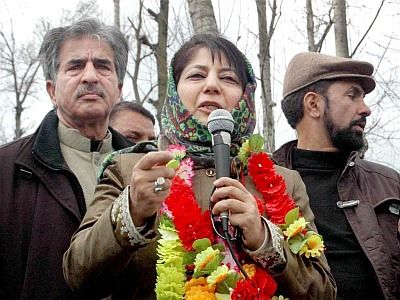 The PDP is the front-runner in the Jammu and Kashmir assembly polls. The ruling National Conference and Congress will be lucky to reach double figures, says Mohammad Sayeed Malik.
The PDP is the front-runner in the Jammu and Kashmir assembly polls. The ruling National Conference and Congress will be lucky to reach double figures, says Mohammad Sayeed Malik.
With the first round of five-phase polling in the Jammu & Kashmir assembly elections just over a week away, the scene on the ground appears to have changed beyond recognition from it was in 2008.
Unlike in the rest of the country, the J&K assembly has a six-year term, thanks to the love of the local political class for preserving this 'excess' from the notorious Emergency era of the 1970s.
The front-runners in previous elections, the National Conference and the Congress, find themselves pushed into the political doghouse while the erstwhile (relatively) marginal players, the Peoples Democratic Party and the Bharatiya Janata Party have emerged as the principal contenders.
For over four decades, the electoral scene was dominated by the National Conference and the Congress; the former drawing its strength from the Muslim-majority Kashmir Valley accounting for 44 out of the total 87 assembly constituencies and the Congress dominating the other two regions -- Hindu-majority Jammu (39 seats) and Ladakh (4 seats) which according to the latest census has nearly an equal population of Buddhists and Muslims.
The most recent yardstick, the Lok Sabha polls held earlier this year, suggests an uphill task for the National Conference and the Congress. The National Conference, which won 30 seats in the 2008 polls, is in serious danger of facing a near eclipse, thanks mainly to the disastrous performance of its ruling alliance (with the Congress) under Omar Abdullah's leadership.
Omar had to flee his (dynastic) traditional Ganderbal constituency to contest the assembly election from -- not one -- but two 'safe' constituencies, Sonwar and Beerwah. His fate hangs in the balance with no certainty about the outcome.
The Congress had got used to playing the king-maker since 2002, alternating its 'favours' between the PDP and the National Conference. Rahul Gandhi's intervention in 2008, resulting in the sidelining of Farooq Abdullah and catapulting his son to the forefront, ended up in unprecedented disaster for both.
Their ruling alliance lost all the six Lok Sabha seats (3 each to the PDP and the BJP) in the May election. For the first time since 1977, following Sheikh Abdullah's return to power in 1975 under the Kashmir Accord, the National Conference has to learn to live without any representation in Parliament.
If at all it had nursed any hope of recovering some lost ground it was washed out by the recent floods in which the National Conference-Congress coalition became the target of public wrath for its abject non-performance and Omar lost much of his sheen. Today his credibility is mud and his vote-catching potential is at its lowest.
Besides, he and his party must miss Dr Farooq Abdullah, who is in London with health problems. Not that Farooq's image remained unaffected by what his son had brought upon their party and the dynastic prestige. Farooq's stunning maiden electoral defeat in the 2014 Lok Sabha election (by the PDP's hardly known rival) from its home ground, Srinagar, by a margin of nearly 50,000 votes badly dented his political image.
The BJP's noisy campaign over its so-called 'Mission 44+' looks to be more a hot air balloon than any serious proposition. Indications at this stage are that the BJP is most likely to fall far short of its intended '44' target. Its prospects appear to be in the 20, 25 seat range.
The PDP led by Mufti Mohammad Sayeed looks poised for the number one position fairly ahead of the BJP. Mehbooba Mufti, the PDP president and Mufti's daughter, insists the party will come up with a majority of its own in the 87-member assembly. Right now, there are not many takers for that forecast.
The National Conference and the Congress, though still sharing power in the caretaker regime, have been going at each other's throats over who was responsible for the catastrophe brought upon the alliance. Going by available indicators on the ground, the National Conference would be lucky to hit the double digit mark (against the 30 it won in 2008). Almost ditto for the Congress.
The BJP's emergence on the Kashmir scene is somewhat deceptive, giving rise to an inflated estimation of its likely potential in the arena. Unlike the PDP in the valley, the BJP has all along been an insignificant player in the Jammu region and totally absent from the Kashmir scene.
But its resounding victory in the parliamentary elections, including its maiden victory in Ladakh, gifted it with a larger than life profile. Its presence in the valley so far looks to be symbolic; not reckonable in poll arithmetic. Thanks to the media's overdrive, this deceptive imagery is being exploited by the party to bolster its 'Mission 44+'.
Image: The PDP's Mehooba Mufti at a campaign rally. Photograph: Reuters











 © 2025
© 2025